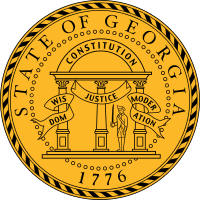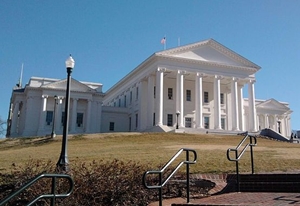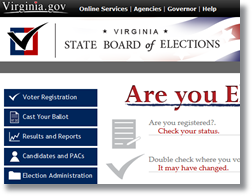The Senate passed a bill to widen the ability of lobbyists to provide campaign contributions. Senate Bill 655 allows a lobbyist to deliver or personally make political contributions as early as April 15 of a general election year. Currently, lobbyists […]

The Senate passed a bill to widen the ability of lobbyists to provide campaign contributions. Senate Bill 655 allows a lobbyist to deliver or personally make political contributions as early as April 15 of a general election year. Currently, lobbyists must wait till June 1 to personally make contributions.
A proposal to allow lobbyists to deliver campaign contributions during a floorperiod did not pass. The bill now goes to the Assembly.
March 12, 2014 •
Georgia Lawmakers and Lobbyists Work with New Ethics Law
Georgia lawmakers and lobbyists are adapting new gift limits to old reporting methods while the ethics commission attempts to draft rules. House Bill 142 established the first-ever limit on lobbyist spending by capping the value of a gift a lobbyist […]

Georgia lawmakers and lobbyists are adapting new gift limits to old reporting methods while the ethics commission attempts to draft rules. House Bill 142 established the first-ever limit on lobbyist spending by capping the value of a gift a lobbyist could give a lawmaker at $75.
The bill, effective January 1, 2014, has several exceptions including one to remove the $75 cap for any caucus approved by the House or Senate ethics committees.
Once approved as a caucus, the members can accept a gift greater than $75 without everyone in a caucus attending a dinner, so long as the entire group is invited. Even before committee approval, delegations and more traditional caucuses began accepting expensive meals from lobbyists, leaving lobbyists to figure out how to disclose the spending.
The Georgia Government Transparency and Campaign Finance Commission is still months away from unveiling rules governing the new ethics law.
A new Texas Ethics Commission Rule regarding contributions to direct campaign expenditure-only committees became effective today. Texas Ethics Commission Rule §22.5 requires a political committee intending to act exclusively as a direct campaign expenditure-only committee to file an affidavit with […]

A new Texas Ethics Commission Rule regarding contributions to direct campaign expenditure-only committees became effective today.
Texas Ethics Commission Rule §22.5 requires a political committee intending to act exclusively as a direct campaign expenditure-only committee to file an affidavit with the Texas Ethics Commission stating the committee intends to act exclusively as a direct campaign expenditure-only committee and will not use its contributions made to it to make political contributions to any candidate for elective office, any officeholder, or any political committee making a political contribution to a candidate or officeholder.
The new rule requires the committee file the statement before it can accept a political contribution from corporations or labor organizations.
March 12, 2014 •
Virginia State Board of Elections Proposes Filing Deadline Change
The Virginia State Board of Elections is seeking public comment on a proposed change to its campaign finance filing deadline. The Board is proposing moving the deadline for electronic filing from 5:00 p.m. on the due date to 11:59 p.m. […]
The Virginia State Board of Elections is seeking public comment on a proposed change to its campaign finance filing deadline. The Board is proposing moving the deadline for electronic filing from 5:00 p.m. on the due date to 11:59 p.m. on the due date.
The change was proposed by Board Chairman Charles Judd, who said backup in online traffic shortly before the deadline could result in late filings, and the 5:00 p.m. deadline was based on a close-of-business mindset prior to the existence of electronic filing.
The Board will accept public comments through March 26, 2014, and may be submitted at http://www.sbe.virginia.gov/.
March 12, 2014 •
Amber Fish Linke Speaking at Public Affairs Council
Amber Fish Linke, Director of Client and Product Operations at State and Federal Communications, will be a presenter at the Public Affairs Council’s “March in the Midwest: A State Government Relations Workshop” on March 13, 2014 in Chicago, Illinois. Amber […]

Amber Fish Linke, Director of Client and Product Operations at State and Federal Communications, will be a presenter at the Public Affairs Council’s “March in the Midwest: A State Government Relations Workshop” on March 13, 2014 in Chicago, Illinois.
Amber will team up with political activity lawyer Chris Ashby in the final session, “Overcoming State-Level Compliance Concerns.”
Here is a description of their talk, according to the Public Affairs Council website:
Even the best strategies mean nothing if they’re not carried out ethically. Make sure you’re staying in compliance, meeting your reporting deadlines and protecting your organization’s reputation by learning:
- Regional compliance trends and issues
- Lobbying laws at the state level
- How to comply with gift and pay-to-play rules
- How to build sound compliance procedures that minimize risk
March 11, 2014 •
Tuesday Lobbying and Campaign Finance News Update
Lobbying “Bottom Line” in The Hill. California: “Fourth client drops lobbyist firm hit with record fines” by Patrick McGreevy in the Los Angeles Times. Washington: “Lobbyist Paid Meals Legislation Appears To Die In Washington Statehouse” by Austin Jenkins in KUOW. […]

Lobbying
“Bottom Line” in The Hill.
California: “Fourth client drops lobbyist firm hit with record fines” by Patrick McGreevy in the Los Angeles Times.
Washington: “Lobbyist Paid Meals Legislation Appears To Die In Washington Statehouse” by Austin Jenkins in KUOW.
Campaign Finance
“Illegal Campaign Contributions By Lawyer at Florida Law Firm” by Kent Cooper in Roll Call.
Utah: “House kills campaign donation limits bill” by Lee Davidson in The Salt Lake Tribune.
Wisconsin: “Wisconsin big business interests back campaign finance bill” by Jack Craver in The Capital Times.
Ethics
District of Columbia: “D.C. Businessman Tied to 2010 Mayoral Campaign, Federal Candidate Faces Corruption Charges” by Hannah Hess in Roll Call.
District of Columbia: “Gray knew of ‘shadow campaign,’ Thompson prosecutors say; mayor says it’s all a lie” by Ann E. Marimow, Matt Zapotosky and Paul Schwartzman in The Washington Post.
Honolulu, Hawaii: “Honolulu Ethics Director Takes His Case for More Money to City Council” by Sophie Cocke in the Honolulu Civil Beat.
Michigan: “Michigan campaign finance violation draws near-record fine for union’s actions in 2012 election” by Brian Smith in Michigan Live.
March 11, 2014 •
U.S. District Court Addresses Illinois Campaign Finance Law
Contributions limits will likely remain in place for the entire 2014 election cycle as Illinois Liberty PAC v. Madigan carries on. In July 2012, the Liberty Justice Center filed suit against Attorney General Lisa Madigan, challenging the Illinois Disclosure and […]

Contributions limits will likely remain in place for the entire 2014 election cycle as Illinois Liberty PAC v. Madigan carries on. In July 2012, the Liberty Justice Center filed suit against Attorney General Lisa Madigan, challenging the Illinois Disclosure and Regulation of Campaign Contributions and Expenditures Act on constitutional grounds.
Specifically, Plaintiffs claim the Act violates the First Amendment and the Equal Protection Clause by exempting political parties from the contribution limits applicable to PACs and individuals, by lifting contribution limits in races where a self-funding candidate or independent expenditure committee spends more than a particular threshold, and by imposing lower contribution limits on PACs than are imposed on corporations, labor unions, and other organizations.
The complaint also challenges the Act’s constitutionality because it classifies legislative caucus committees as political party committees and thereby treats them more favorable than PACs, corporations, and individuals, without valid reasoning.
On March 3, U.S. District Judge Gary Feinerman denied Defendant’s motion to dismiss with respect to the treatment of legislative caucus committees but granted the motion with respect to all other challenges.
Although the court suspects legislative caucus committees are sufficiently similar to political party committees for purposes of constitutional analysis, the case remains open to give both sides a fair opportunity to address the issue.
March 11, 2014 •
California Lawmakers Send FPPC Bill to Governor
Lawmakers sent Gov. Jerry Brown a bill designed to strengthen campaign finance laws in response to a recent case prompting the largest campaign reporting fine in state history. Assembly Bill 800 gives the Fair Political Practices Commission (FPPC) the […]
 Lawmakers sent Gov. Jerry Brown a bill designed to strengthen campaign finance laws in response to a recent case prompting the largest campaign reporting fine in state history. Assembly Bill 800 gives the Fair Political Practices Commission (FPPC) the authority to audit campaign funds and seek court injunctions to force compliance with its investigations before elections.
Lawmakers sent Gov. Jerry Brown a bill designed to strengthen campaign finance laws in response to a recent case prompting the largest campaign reporting fine in state history. Assembly Bill 800 gives the Fair Political Practices Commission (FPPC) the authority to audit campaign funds and seek court injunctions to force compliance with its investigations before elections.
The bill is a response to $15 million in anonymous donations given through an Arizona-based nonprofit that funneled the cash to California political action committees through intermediary groups. The FPPC issued a $1 million fine against two of the groups involved.
March 11, 2014 •
Maryland Procurement Bill To Require Reparations
Lawmakers are considering a bill to block one of the firms seeking to bid on a multibillion-dollar light rail project from winning its bid unless it agrees to pay reparations to Holocaust victims. Delegate Kirill Reznik co-sponsored House Bill 1326 […]

Lawmakers are considering a bill to block one of the firms seeking to bid on a multibillion-dollar light rail project from winning its bid unless it agrees to pay reparations to Holocaust victims. Delegate Kirill Reznik co-sponsored House Bill 1326 to block Paris-based Keolis from winning a contract worth $6 billion for the state’s Purple Line project.
Keolis is a subsidiary of the government-owned French railway Société Nationale des Chemins de Fer Français (SNCF), which has admitted transporting about 76,000 Holocaust victims to concentration camps in Nazi-occupied France.
The bill would expand a 2011 law requiring companies to disclose involvement in transporting victims during the Holocaust.
March 10, 2014 •
Monday News Roundup
Lobbying “Roscoe Bartlett, defense lobbyist” by Austin Wright in Politico. “Lobbying Firm Patton Boggs Fights for Itself” by Jennifer Smith and Elizabeth Williamson in The Wall Street Journal. Canada: “Lawmakers top lobbyists in annual hockey game” by JulieAnn McKellogg and […]

Lobbying
“Roscoe Bartlett, defense lobbyist” by Austin Wright in Politico.
“Lobbying Firm Patton Boggs Fights for Itself” by Jennifer Smith and Elizabeth Williamson in The Wall Street Journal.
Canada: “Lawmakers top lobbyists in annual hockey game” by JulieAnn McKellogg and Emily Heil in The Washington Post.
New Jersey: “Hospitals were top spenders on lobbying in 2013, report says” by Susan K. Livio in The Star-Ledger.
Wyoming: “Editorial board: Wyoming lobbyists laws too weak, unenforced” in the Casper Star-Tribune.
Campaign Finance
“Comcast spreads cash wide on Capitol Hill” by Tony Romm in Politico.
Illinois: “Lawsuit challenging campaign financing limits won’t affect 2014” by Kurt Erikson in the Herald & Review.
Iowa: “Is anonymous donating the next big thing in Iowa politics?” by Mike Wiser in the Globe Gazette.
Louisiana: “Campaign finance bills filed for legislative session that begins March 10: List” by Dan Swenson in The Times-Picayune.
North Carolina: “Dark money comes to light” by Mark Binker in WRAL News.
Utah: “Senate panel endorses campaign finance reform bills” by Dennis Romboy in the Deseret News.
Ethics
California: “California Legislature considers ethics reform bills” by Patrick McGreevy in the Los Angeles Times.
New York: “Assemb. William Boyland guilty on all counts” by John Riley and Anthony M. Destefano in Newsday.
South Carolina: “Book’s sale at park shops needles Sheheen campaign” by Rudolph Bell in The Greenville News.
West Virginia: “Bill would change ethics commission” by Phil Kabler in the Charleston Gazette.
Wisconsin: “Controversial election bills find little support in state Senate” by Matthew DaFour in the Wisconsin State Journal.
Legislative Sessions
Virginia: “Bills of note that passed in the 2014 General Assembly session” by The Associated Press in The Loudoun Times.
Government Tech and Social Media
Minnesota: “Minnesota Announces Civic Tech Legislation” by Sam Roudman in TechPresident.
West Virginia: “Onlookers often rely on social media for session updates” by Mandi Cardosi in The State Journal.
March 10, 2014 •
Oregon Legislature Adjourned
The Oregon Legislative Assembly adjourned sine die on Friday, March 7. The 2014 session lasted 33 days, 2 days short of the maximum allowed under the Oregon Constitution. Lawmakers will now turn their attention to campaigning, as all 60 […]
 The Oregon Legislative Assembly adjourned sine die on Friday, March 7. The 2014 session lasted 33 days, 2 days short of the maximum allowed under the Oregon Constitution.
The Oregon Legislative Assembly adjourned sine die on Friday, March 7. The 2014 session lasted 33 days, 2 days short of the maximum allowed under the Oregon Constitution.
Lawmakers will now turn their attention to campaigning, as all 60 House seats and half of the 30 Senate seats will be up in November.
March 10, 2014 •
Virginia General Assembly Adjourns After Passing Ethics Reform
The Virginia General Assembly adjourned sine die on Saturday, March 8, 2014. The session ended without a state budget, the result of a standoff on whether to expand the state’s Medicaid program. Governor Terry McAuliffe announced he would call legislators […]

The Virginia General Assembly adjourned sine die on Saturday, March 8, 2014. The session ended without a state budget, the result of a standoff on whether to expand the state’s Medicaid program. Governor Terry McAuliffe announced he would call legislators back for a special session to begin March 24.
Before adjourning, the General Assembly passed significant ethics reform, limiting gifts from lobbyists, principals, and persons seeking to do business with the state to $250. The legislation also created the Virginia Conflict of Interest and Ethics Advisory Council, tasked with receiving disclosure forms from legislators and lobbyists and enforcing the newly-created ethics laws.
A new semiannual lobbyist reporting schedule will take effect July 1, 2015, with the first report filed under the new framework due December 15, 2015. The new filing schedule does not affect the annual report due July 1, 2014. The final bill awaits signature by Gov. McAuliffe.
Photo of the Virginia State Capitol by Varmin on Wikimedia Commons.
March 10, 2014 •
Canada RCMP Investigating Illegal Lobbying
The Royal Canadian Mounted Police (RCMP) is investigating allegations of illegal lobbying by a former senior adviser to Prime Minister Stephen Harper in connection with work for an energy advocacy group in Calgary. The RCMP says after Bruce Carson left […]
 The Royal Canadian Mounted Police (RCMP) is investigating allegations of illegal lobbying by a former senior adviser to Prime Minister Stephen Harper in connection with work for an energy advocacy group in Calgary. The RCMP says after Bruce Carson left the Office of the Prime Minister (PMO) he was paid for his top level involvement with federal contacts and to influence a new national energy strategy.
The Royal Canadian Mounted Police (RCMP) is investigating allegations of illegal lobbying by a former senior adviser to Prime Minister Stephen Harper in connection with work for an energy advocacy group in Calgary. The RCMP says after Bruce Carson left the Office of the Prime Minister (PMO) he was paid for his top level involvement with federal contacts and to influence a new national energy strategy.
As a past senior adviser to Harper, Carson is subject to a five-year ban on lobbying under the Lobbying Act.
Lobbying Commissioner Karen Shepherd initiated a probe of Carson’s lobbying activities for the Canada School of Energy and Environment and a business-funded group called the Energy Policy Institute of Canada (EPIC). Shepherd referred the allegations to the RCMP in July 2012.
EPIC’s lawyers assumed the group would be in compliance if Carson’s job description was to communicate “for the purpose of information exchange and not to represent EPIC’s view, opinion, or to ask for a decision from government.”
March 7, 2014 •
Quebec Premier Calls Election for April 7
Pauline Marois, the premier of Quebec, has called a general election to be held on April 7. Currently, elections in Quebec only take place upon a decree by the premier. Beginning in 2016, elections will have set dates. When […]
 Pauline Marois, the premier of Quebec, has called a general election to be held on April 7. Currently, elections in Quebec only take place upon a decree by the premier. Beginning in 2016, elections will have set dates.
Pauline Marois, the premier of Quebec, has called a general election to be held on April 7. Currently, elections in Quebec only take place upon a decree by the premier. Beginning in 2016, elections will have set dates.
When an election is called in Quebec, the legislative assembly dissolves (adjourns) and voters chose an entirely new one. Candidates have 33 days to campaign for the upcoming election.
Since Quebec has a parliamentary system of government, the leader of the party who garners the most assembly seats becomes the premier.
State and Federal Communications, Inc. provides research and consulting services for government relations professionals on lobbying laws, procurement lobbying laws, political contribution laws in the United States and Canada. Learn more by visiting stateandfed.com.



